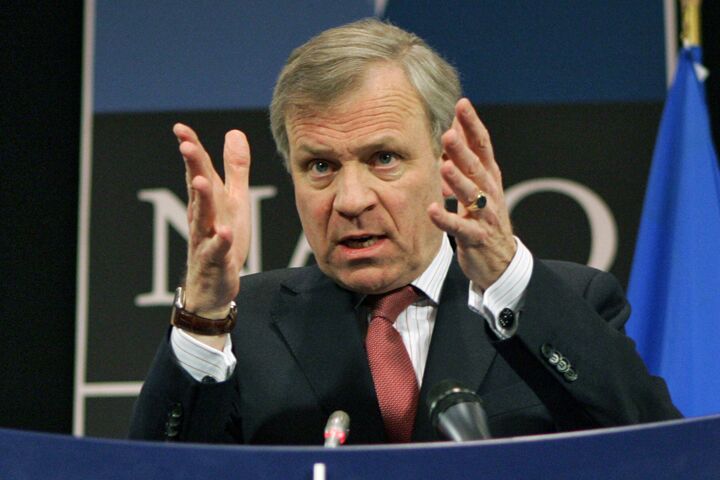
The New NATO: Europe’s “Vital Enabler”
On Saturday, Jaap de Hoop Scheffer said that the North Atlantic Treaty Organization should pool its military capabilities with the European Union. He also said that the militaries of member nations should be “equally available to both nato and the EU.”
For those who have been watching Europe’s power-grabbing tactics, it comes as little surprise that a leader like de Hoop Scheffer, an admitted Europhile who voted for the failed European Constitution and was the former leader of the Netherlands’ most pro-EU party, would want to entitle the EU to nato assets. What might come as a little surprise is de Hoop Scheffer’s office.
He is the secretary general of nato. In a speech at the Brussels Forum on March 15, de Hoop Scheffer said:
I believe that taking nato reform seriously means also to look for more synergies with the European Union. I would like to see much more pooling of our capabilities, especially in areas such as vital enablers, transport and helicopters, or in research and development, or in harmonizing our force structures and training methods. After all we only have one common set of national defense budgets and national military forces. So it is absolutely critical that all of the capabilities that we are able to generate from this pool of forces are equally available to both nato and the EU.
In an article titled “neuto,” the Brussels Journalwrote on Sunday, “In yesterday’s speech, de Hoop Scheffer ticked all the scare boxes, from cyber-crime, through international terrorism up to and inevitably including global warming.” Read more about EU militarization and the tenet of global warming here.
The EU helping itself to more nato resources and hardware is more than just notional. De Hoop Scheffer wants to give the concept hard traction as early as 2009 at the organization’s 60th anniversary summit. He cites a post-Bush U.S. administration as a vital enabler for his new “Atlantic Charter,” an entirely new nato approach to world security: more Eurocentric, much less America-centric.
Europe’s bid for a partial takeover comes as nato roils amid an identity crisis. The alliance formed in 1949 to withstand aggression from the Soviet Union. When that iteration of Russian power collapsed in 1991, the treaty was rendered suddenly and indefensibly obsolete, and the alliance had two choices: expand its product line or close up shop. It chose the former, partnering with the United States in the endorsement of, and active engagement in, the illegal Balkan wars and the on-again-off-again liberation of Afghanistan from the Taliban.
With most of its new, post-Cold War interventionist products being largely ineffectual at best, nato is looking to overhaul itself into an alliance that can more effectively meet the present dangers—a reformation that will mean a change to a Eurocentric focus, and increasing marginalization of American interests.
Senior officers have called for an altogether new nato pact to be discussed next month at the alliance’s next summit in Bucharest. The manifesto, among other things, calls for key threats to be defined as political fanaticism, religious fundamentalism, international terrorism, organized crime and nuclear proliferation; for the authority to use force without United Nations approval and for the resolve to use pre-emptive nuclear strikes if necessary.
The intention is to place the EU in a more powerful governing role.
As theTrumpet.com reported in January,
Whether or not the proposed nato manifesto is implemented, watch for Europe to take up the mantle of global policeman as the military might and will of America wanes. If Europe is given a governing role in nato, it will only further catapult Europe as a global policy-shaper.
nato’s renovation could soon transform it into a more active, less-constrained or restrained entity. More important than this, however, will be who is behind the controls. The Trumpet expects Washington—likely with a more compromising, isolationist executive policy after 2008—to be phased out, and the EU to be phased in.
Most important of all, however, is which nation is the prime mover behind the EU. That nation is already the economic and political powerhouse and driving force behind European unification and empowerment. It’s the same nation that was the prime mover behind the scenes in the Balkan wars. Already seeking a more prominent role in Afghanistan and a stronger decision-making role in nato, it has a history of surprise warfare. It successfully destabilized, bombed by proxy and consolidated control of the Balkan Peninsula and is now embedded in the endgame in Kosovo. It has shrugged off the guilt of its recent history and declared itself combat-ready in northern Afghanistan and its generals are actively involved in the proposed restructuring of nato to give it a nuclear first-strike capability.
This nation, which holds the most dangerous résumé in the world, is poised to escalate its use of the power of the combined armies of nato as its own vital enabler.
The secretary general is already on board.
For more on this subject, read April’s Trumpet cover story, “On the March.”
